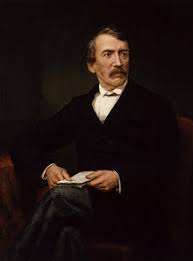
David Livingstone: A Life that Lightened the Dark Continent
Pr. Biju Eapen
On the first day of creation, God said, “Let there be light” (Genesis 1:3), and light appeared as a thing separate from darkness. The phrase let there be light is a translation of the Hebrew phrase ‘Yehi’ and its literal translation would be a command, something like “Light, exist.” God is speaking into the void and commanding light to come into being. The reality of the creative power of God’s voice has important spiritual implications of light in to the lives of the people that go well beyond the creation account itself. Light is often used as a metaphor in the Bible, and the word illumination (“divine enlightenment of the human heart with truth”) has to do with bringing things into the light. In gospel of Mathew Jesus says ‘You are the light of the world’( Matthew 5:14 ). What an enormous compliment!’ Then in the gospel of John He says, ‘I am the light of the world’ (John 8:12; 9:5).’ This means that the disciple is what God and Christ are: that is light. This is not just a compliment but to be identified with God is an enormous responsibility as well. In other word we are called to be ‘the light of the world’ through our words and deeds.
This article deals with David Livingstone (1813-1872) an explorer, missionary, and anti-slavery campaigner. He became a great hero of the Victorian era for his epic discoveries in Africa and his life spread light in the darkened continent.
Early Life
David Livingstone was born on March 21, 1813 in the mill town of Blantyre, Scotland. His father was a committed Protestant Sunday school teacher. His father’s religious influence played a key role in influencing the young David and he grew up with an aspiration to become a missionary himself.
From an early age, David was fascinated with geology, science and the natural world.He showed unusual love for nature, and through great perseverance, which always characterized his life. Due to his father’s influence, he worried that science may conflict with religion. However, after reading Thomas Dick’s ‘Philosophy of a Future State’, David was able to reconcile religion with science. At ten he made his own living in the cotton mills while spending his evenings in night school. Despite the long hours in the mill, he found time to study after work, this experience left him with respect and empathy for workers and slaves.
In 1836, he entered Anderson’s College in Glasgow to train as a medical missionary. He said, "It is my desire to show my attachment to the cause of Him Who died for me by devoting my life to His service." Contact with Robert Moffat, pioneer missionary to Africa, urged Livingstone to offer his services to this needy field. Livingstone enthusiastically travelled to Africa where he strengthened his ideals of Christian missionary, greater scientific discovery and the abolition of slavery.
Journey to Africa
On December 8, 1840, Livingstone sailed for Africa. Going by Cape Town and Algoa Bay he was soon in the interior where Moffat was at work in the Bechuana territory. His intense desire was all natives should have an opportunity to embrace Christianity, and he decided to work where no white man had worked, led him to locate at Mabotsa, northward in the interior. This locality was infested by lions, Livingstone was attacked by lion and he narrowly survived death after being mauled by a lion.
However, in Africa he realised the difficulty of making converts to Christianity. In 1845 the Livingstones moved to Chonuane, and later to Kolebeng, where Sechele, the chief of the tribes, became his first convert. These moves were the first steps of this brave man's life. Each letter sent to home ended with the words, "Who will penetrate the heart of Africa?" He sickened at heart when he heard of well-fed Christians at home engaged in hair-splitting discussions over doctrinal themes when millions were dying without the Gospel where he was.
In 1845 he married Dr Robert Moffat’s eldest daughter, Mary. After the initial period, David Livingstone has increasingly turned his attention to exploration of the African continent.
Identified with locals
Livingstone had great success as an explorer partly because of his ability to get on with local tribal chiefs. He travelled lightly without soldiers and this non-confrontational approach made it easier for him to be welcomed. He also had an ability to empathise with African locals and Livingstone was generally warmly remembered by native Africans – helping to improve relations between Britain and native Africans. On these journeys he shared the gospel and he preached Christian messages but did not force tribal chiefs to accept it, like some of his contemporaries.
Self-Denial and Losses
Livingstone conceived the idea that, if a way were opened from the interior to the coast, Christianity, civilization and commerce would move freely to these benighted people. But the undertaking involved fearful hardships and much self-denial. It was about this time that he wrote, "I place no value on anything I have or possess except in relation to the kingdom of Christ." Taking his wife and children to Cape Town, where amidst many tears and heart struggles he saw them sail for England on April 23, 1852, he set his face to this new purpose. But he found many obstacles. The Dutch Boers, who had robbed and subjected the natives to the worst slavery, opposed his efforts to the extent of destroying his home and carrying away his household goods. He fought against the slavery trade prevailed over African villages and his endeavour of liberative mission was challenged by the slave traders. His tired less effort was showing light to the innocent ones to get rid of the oppressive system.
Livingstone threw himself into the heart of Africa on November 11, 1853, and after seven months of untold hardship, reached St. Paul de Loanda, on the west coast. During the journey he had thirty-one attacks of intermittent fever; towards its close these were accompanied by dysentery of the most painful type. Often he was needy of food and especially of the kind needed for his condition. The horrors of polygamy, incest and cannibalism were terrible. The manifestations of the shameful slave trade constantly disturbed mightily on the tender heart of the noble missionary.
New Discoveries
A journey of two thousand miles for new discoveries from the east coast to other end on Sep. 24, 1854 was challenging and faced lot of obstacles.. Many hostile tribes had to be met and tactfully handled; many dangers were found in the way. After arriving at Linyanti on September 11, 1855, he went down the Zambesi River and discovered the famous, beautiful Victoria Falls.Livingstone renamed it Victoria falls in honour of Queen Victoria. In 1854-56 he made the first successful transcontinental journey across Africa from Luanda on the Atlantic to Quelimane on the Indian ocean. His map and observations were of greatest value to the Royal Geographical Society. On May 20, 1856, he reached Quilimane on the east coast and thus covered a territory never before traversed by a white man.
Livingstone wrote his first book, "Missionary Travels," a great success in sales and awakening interest in Africa. The London Missionary Society which sent him out felt that it was not right to use his time in exploring the country. Livingstone had a strong conviction that "the end of the exploration is the beginning of the enterprise. " At last, because so many looked upon his work as not missionary, he withdrew from the Board and engaged with the Royal Geographical Society and went out as the Queen's consul. He received a commission from the Royal Geographic Society and this helped fund an exploration up the River Zambezi.
Death of Mrs. Livingstone
After spending a year at the Cape, Mrs. Livingstone returned to England and placed her children in school. In 1862 she joined her husband in Africa, but was not with him over three months when, from the banks of the Shire, she went to be with her Lord. In all of life's hardships and trials nothing called forth words from our hero like these, - "For the first time in my life I want to die."
Hardships
The next two years, July, 1869, to October, 1871, were spent in a journey from Ujiji to the river Lealaba and return, and were perhaps the saddest years of his life. He visitedthousands of villages about which Moffat told, and which caused him to give his life to Africa. He, himself, preached to thousands and tens of thousands of natives. But his strength failed him in 1871. Feet sore from ulcers; teeth falling out; weary of body and sick of heart, he lay in his hut for eighty days, longing for home, now far beyond his reach. His sole comfort and help was his Bible, which he read through four times during this period, he wrote these significant words: "No letters for three years. I have a sore longing to finish and go home, if God wills”.
Last moments
He rested quietly on the 30th; but on the morning of May 1,1873, the boy who slept at Livingstone's door wakened, beheld his master, not in bed; but kneeling at the bedside, with his head buried in his hands upon the pillow. The sad, yet not unexpected truth soon became evident; he had passed away on the furthest of all his journeys. But he had died in the act of prayer, - prayer offered in that reverent attitude about which he was always so particular; commending his own spirit, into the hands of his Savior; and commending Africa, his own dear Africa, to the Redeemer. However, the local Africans were somewhat reluctant to give up Livingstone. In the end they cut out his heart and gave back his body saying:“You can have his body, but his heart belongs in Africa!” They dried the body in the sun, tied it to a pole and after nine months' march reached the coast and shipped it to England. On April 18, 1874, His body was taken to England and buried in Westminster Abbey, London. A life still remains in the memories of thousands because his life that illuminatedthe Dark Continent with the gospel of Christ.
Conclusion
“God, who said, ‘Let light shine out of darkness,’ made his light shine in our hearts to give us the light of the knowledge of God’s glory displayed in the face of Christ” (2 Corinthians 4:6). It is when we live a life characterized by the mission of God that makes us shine like stars in the darkness of this world. Paul says in Philippians 2:15, that you may become blameless and harmless, children of God….., among whom you shine as lights in the world. Wecanshine as light in the dark world only when we live a Christ like life. In Ephesians 5.8, Paul says, For you were once darkness, but now you are light in the Lord. The life of David Livingstone was an exemplary life whichilluminated the Dark Continent with the light of the gospel of Christ. His life story put before us the challenge of unfinished missional task. Let us pray and be pragmatic so that God mayignite the light of the gospel to shinein our country.




